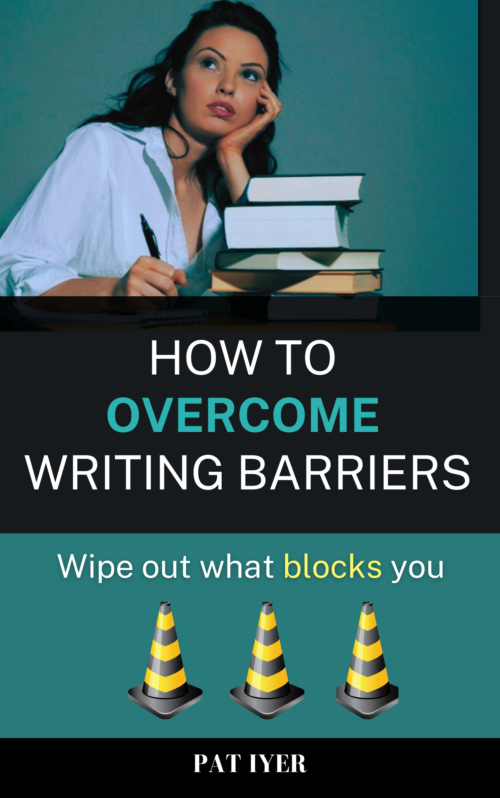One of the most frequent complaints of my writing students and clients is “I don’t have enough time. How do I fit writing time into my life?
I know how you can feel that time is precious and in short supply, and I recommend to those I coach that they make an accurate and detailed chart of where their time goes.
Recently, though, I’ve realized that the larger problem may be what people do with the time they’ve set aside for writing. If you have 90 minutes for writing and spend 45 of them on the Internet other than for research purposes, you’ve lost at least half of your time—and maybe more, as I explain below.
All animals have an innate ability to switch their focus. If you’ve ever seen a deer grazing, you will have noticed that it looks around frequently, ears twitching. It pays attention to a snapping twig or threatening sound. The ones who graze outside my house react when they hear me running water in the kitchen sink.
Humans have that same ability, but, unlike deer and other animals, we get distracted by far more subtle forces. As a result, our attention spans are shrinking.
Why Is This Happening?
If you answer, “social media, cell phones, email,” you’re right. Add to that mix that we’ve equated missing out as dangerous, (you’ve heard of FOMO – fear of missing out) . You have a powerful incentive to stop writing that book, report, blog post or other form of writing to check your email—because the fear of missing out says something earthshaking may have arrived in your inbox during the ten minutes since you last checked.
Do you think I’m exaggerating? On average, professionals check their email 15 times per day, or every 37 minutes. That amounts to spending 28% of your work day reading and answering emails, for a staggering 26 hours a day. Add up that time on a weekly basis and you can see how it cuts Into writing time.
 We also distract ourselves internally. You might be writing away and remember a phone call you need to make. You keep on writing, but that phone call nags at you. (When that happens, I make the call. It saves time.) I also keep paper near me at all times so I can capture those nagging thoughts for when I can take action on them.
We also distract ourselves internally. You might be writing away and remember a phone call you need to make. You keep on writing, but that phone call nags at you. (When that happens, I make the call. It saves time.) I also keep paper near me at all times so I can capture those nagging thoughts for when I can take action on them.
Consider this expert has to say: Dr. Gloria Mark is a psychologist and the chancellor’s professor of informatics at the University of California Irvine and a student of people’s interactions with technology and the effects of these interactions on attention, moods, and stress levels. She learned that for the past two decades, attention spans have been shrinking from two-and-a-half minutes on a screen to 47 seconds.
She wrote a book, Attention Span: A Groundbreaking Way to Restore Balance, Happiness, and Productivity. Dr. Mark talks about the book here.
How Do Lowered Attention Spans Affect Us and Our Writing Time?
Dr. Marks says the research has shown that frequent attention leads to stress and rising blood pressure. It also causes more errors. Performance slows because of what’s called a switch cost, meaning that when you shift attention, you have to reorient to the new focus.
Here’s how this affects writers during writing time.
“Imagine if you’re writing, let’s say, say you’re writing a chapter and you suddenly stop what you’re doing and you switch and do something else, and then you come back to it, it’s going to take you some time to reconstruct, “What was I writing? What was the topic I was thinking about? What were the words I was using?” That takes a bit of time.
We incur these switch costs throughout the day as we’re switching our attention, and this creates more effort. It uses more of our very precious mental resources on top of the work that we actually need to do.” (From https://www.apa.org/news/podcasts/speaking-of-psychology/attention-spans
How to Improve Your Attention Span
Neither Dr. Marks nor anyone else studying attention spans is advocating chaining yourself to one screen. Unbroken hours of writing or research can lead to burnout. The key is to find a logical break point. In writing, this could come at the end of a section of a blog or a book chapter. For research, it could come after you’ve read and summarized an article. These make good places for taking a break.
Some people, including me, have advocated the Pomodoro method, working for 25 minutes followed by a five-minute break. Dr. Mark believes that this can force a rigid schedule that doesn’t work for everyone. Some people can work for 15 minutes, some for 30. Each of us is unique and need to find our individual schedules. Use the Pomodoro principle, but adapt it to yourself.
 Practice some form of mindfulness technique. These can include:
Practice some form of mindfulness technique. These can include:
Meditation,
Yoga,
Chi Kung,
Or breath work.
Meditation improves focus, can empty the mind of mental debris, and reduces stress. For those who think meditation is boring, imagine lying down or sitting comfortably, and listening to relaxing music. Start with a few minutes a day and gradually increase your time.
Yoga and chi kung involve more time. If you don’t have the option of live classes, you can also find instructional videos on YouTube. Learn a few forms and practice them daily. In time, you may come to see them as your favorite stress relievers.
Here’s an example of an easy breathing method.
1. Inhale for four counts.
2. Hold for four counts.
3. Exhale for eight counts.
As you do this, it can help to put your hands on your solar plexus. In natural breathing, the solar plexus expands on the inhale and contracts on the exhale. Most people do the opposite, which leads to increased stress. Consciously retraining yourself to breathe correctly can improve your focus and lower your stress.
Start with a few breaths and increase the number gradually.
If this particular method doesn’t appeal to you, you can find on the Internet one that will.
Practice a few exercises of yoga, chi kung, or conscious breathing when you’re either feeling stuck or a need for distraction. A few minutes can bring you back to the present.
Drink water. Staying well hydrated improves focus and cognition. Most people don’t drink enough water. And I don’t mean liquids in general. Coffee and soft drinks, because of their dehydrating effects, work against hydration.
Practice Conscious Listening. This is a huge subject and one we could all benefit learning more about. In elementary terms it means:
Read more. The printed or electronic page doesn’t offer the visual distractions of video or TV. Reading will improve your focus and attention span. And you never know how what you read may stimulate ideas that generate writing topics.
- Turn off notifications and instead check your email hourly
- Move every email out of your inbox the first time you read it
- Use the search functionality with search operators to re-find emails
- Set up just two email folders and use shortcuts to archive emails there
- Avoid processing irrelevant or less important emails individually
If you have other ideas or practices for improved attention and stress reduction, please let me know. We can all improve in this area.
Much of accomplishing your goals during writing time comes for understanding when you are least distracted and most productive to tackle writing time. When you set small goals, you will see your progress and that will stimulate you to keep going. It works that way for me. As of January 2024, I’ve written 67 books. It did not happen in a weekend.
 Get your instant download of How to Overcome Writing Barriers: Wipe Out What Blocks You. Learn how to subdue your inner critic.
Get your instant download of How to Overcome Writing Barriers: Wipe Out What Blocks You. Learn how to subdue your inner critic.
Pat Iyer MSN RN LNCC is a consultant, speaker, author, editor and coach. She has written or edited over 65 of her own books and worked with a few dozen authors. Pat is an Amazon international #1 bestselling author. Coaches, consultants, and speakers hire Pat to help release the knowledge inside them so that they can attract their ideal clients.
She delights in assisting people to share their expertise by writing. Pat serves international and national experts as an editor, book coach, and a medical and business writer.
